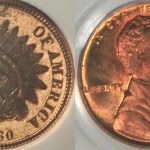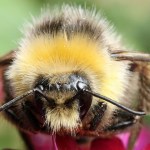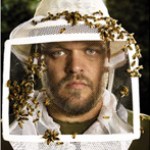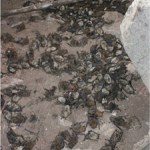colony collapse disorder
In January, Hillary Clinton still possessed the benefit of the doubt. Memories of her and Bill snarling at Barack Obama in 2008 had faded, and despite her long and dreadful record, it's always possible to turn over a new leaf. But Clinton's ongoing response to Bernie Sanders shows why she is unfit for the presidency. Even as the frontrunner, Hillary shows no leadership ability; she, too, follows Sanders, trailing him to the left as he takes meaningful positions on issues like income inequality and campaign finance reform. Her saccharine smile says "I can do that too!" but truly she…
Probably.
I want to start out by welcoming all you bee experts who think it is not the neonicotinoids, or that it is not so simple, to make your case in the comments. There is a great deal of controversy over what is causing bees to die off. That controversy even impinges on how we describe the thing we are talking about. Notice that I've not used the term "colony collapse disorder" because that is a term that may have been misused, or at least, that people who know stuff have noted has been used incorrectly thus mucking up the discussion.
Here's the thing. There is a bee crisis.…
Bioscience for the future has an update o the bee situation in Europe.
Europe has 13.4 million too few honeybee colonies to properly pollinate its crops, according to new research from the University of Reading.
The discovery, made by scientists at the University's Centre for Agri-Environmental Research (CAER), shows that demand for insect pollination is growing five times as fast as the number of honeybee colonies across Europe as farmers grow more insect-pollinated oil crops, such as oilseed rape and sunflowers, and fruit.
Click here to read all about it.
Here's a video:
Published on Jan 8…
Being a bee is hard. I'm speaking specifically of the honey bee, Apis mellifera, the one that produces the honey you buy in the store. Many insects, and other critters, eat by finding food and then eating it, and then they do that for a while and now and then reproduce by finding a mate, laying eggs that they perhaps put in a good location but thereafter leave alone, etc. etc. But honey bees do all of these thing in a way that makes it seem like they are trying to make it harder for them than it is for everyone else. Much of the food that honey bees eat is gathered at rare and hard to…
Bees represent some of the most resilient, adaptable and enterprising insects on earth. Not only that, they pollinate about one-third of all the food we eat. So when honey bees began dying or disappearing at alarming rates in the U.S. and around the world more than four years ago, scientists such as Nifty Fifty Speaker Dennis vanEngelsdorp, as the acting Pennsylvania state apiarist (beekeeper) and one of the nation's most prominent advocates and researchers of bees, was naturally deeply concerned. "Bees and other pollinators are a barometer and referendum on the state of our environment,"…
Im sure this isnt news to any of you-- Honey Bees are dying.
We dont know why.
I thought we had an answer to this problem, and the answer was a virus-- Israeli acute paralysis virus. But although IAPV definitely has an effect on honey bee immunity, apparently it fell through as The Cause of CCD.
We do not have a honey bee parasitome/microme/virome, so we dont totally know which parasites/microbes/viruses are 'normal' and which are the trouble makers, out of the countless parasites/microbes/viruses found in honey bee colonies all over the world. So it could be that CCD is some kind of '…
I hate to get all serious, but this is a topic near-and-dear to me, and one that needs more publicity. And while Zooillogix readers are intelligent and well-informed (and smoking hot, I might add), I want to be sure everyone is aware of the progress and potential of this epidemic. Plus, I know I'm not the only batfan here.
In February of 2006, a caver in eastern New York photographed a group of hibernating bats with an unusual white substance on their muzzles. The following winter, bats were noted flying outside of caves months before they typically come out of hibernation. Then there…
Since late 2006, honeybees in Europe and North America have been mysteriously disappearing. Once abuzz with activity, hives suddenly turned into honeycombed Marie Celestes. They still had plentiful supplies of honey, pollen and youngsters but the adult workers vanished with no traces of their bodies. The phenomenon has been dubbed colony collapse disorder (CCD). In the first winter when it struck, US hive populations crashed by 23% and in the next winter, they fell again by a further 36%.
Eager to avert the economic catastrophe that a bee-less world, scientists have been trying to find the…
This article is reposted from the old Wordpress incarnation of Not Exactly Rocket Science. There's been more work on CCD since, but I'm reposting this mainly because of some interesting follow-up research that will I will post about tomorrow.
In 2006, American and European beekeepers started noticing a strange and worrying trend - their bees were disappearing. Their hives, usually abuzz with activity, were emptying. There were no traces of the workers or their corpses either in or around the ghost hives, which still contained larvae and plentiful stores of food. It seemed that entire…





